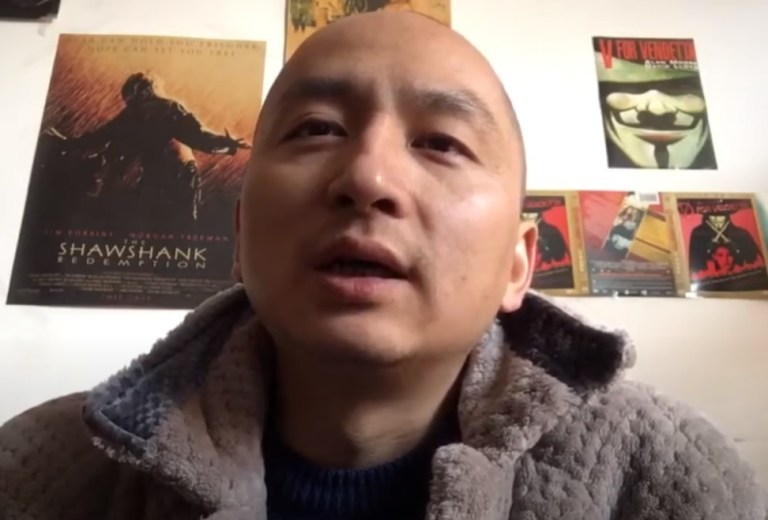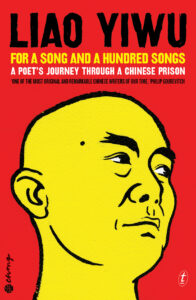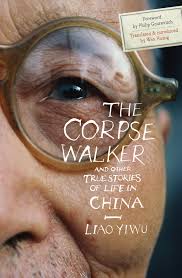
Wang Zang Credit: China Change
In the middle of the night on May 30, 2020, more than fifty armed police surrounded an ordinary residential building in Chuxiong City, Yunnan Province and arrested Wang Zang, an avant-garde poet of the post-1985 generation, on charges of being suspected of “inciting subversion of state power,” notes the exiled writer Liao Yiwu, internationally renowned as the “Chinese Solzhenitsyn.”
 The sky was full of stars, and downstairs the courtyard was full of police cars, ” he writes for China Change. The militarized lackeys of the state swarmed through the corridors and elevator of Wang’s stairwell, as well as those on the left and right of his, surging upwards like a tide, intertwining into an all-encompassing dragnet within a few minutes. When loud banging rang out at his door, Wang Zang and his wife, who had just lain down, jumped out of their bed like springs and hurriedly dressed. Their four children were also woken, crying in unison, loudly enough to shake the roof. Wang Zang rushed out of the bedroom, leaned against the door, took out his phone and started filming, while his wife, Wang Liqin hugged the children tightly.
The sky was full of stars, and downstairs the courtyard was full of police cars, ” he writes for China Change. The militarized lackeys of the state swarmed through the corridors and elevator of Wang’s stairwell, as well as those on the left and right of his, surging upwards like a tide, intertwining into an all-encompassing dragnet within a few minutes. When loud banging rang out at his door, Wang Zang and his wife, who had just lain down, jumped out of their bed like springs and hurriedly dressed. Their four children were also woken, crying in unison, loudly enough to shake the roof. Wang Zang rushed out of the bedroom, leaned against the door, took out his phone and started filming, while his wife, Wang Liqin hugged the children tightly.
I wonder how many Chinese people will have sympathetic responses to Wang Zang’s poems? Liao adds. At least it must resonate with the police comrades, headed by Party General Secretary Xi Jinping, from the Party Central to the local levels, otherwise these poems would not be evidence of “inciting subversion of the country.” More than two months before his arrest this year, Wang Zang came over the Internet wall to his Facebook page and sent me the poem “Kill Yourself Quick”. At the time, Tsinghua University’s Professor Xu Zhangrun’s now famous article “Angry People No Longer Fear” had been circulating for a while, so I changed the title of the poem to “Fearful People Kill Yourselves Quickly”, which I quoted in the third chapter of my new book When the Wuhan Virus Comes….
 Given their rare courage and talent, the German President Joachim Gauck and his wife once met with Wang Zang’s family at the embassy in Beijing and took a group photo with them. I saw it at the time and was happy for him—as President Gauck was once the most influential human rights pastor in the former East Germany before the fall of the Berlin wall in 1989. For many years, he has enjoyed the highest prestige among the German people — in my efforts to rescue Liu Xiaobo and his wife, I frequently corresponded with President Gauck and his wife — I thought he wielded a super international umbrella of protection, but who would have thought “when the nest is overturned, no egg stays unbroken”. This empire of communism, seemingly on the verge of collapse due to the novel coronavirus, has gone crazy from top to bottom. RTWT
Given their rare courage and talent, the German President Joachim Gauck and his wife once met with Wang Zang’s family at the embassy in Beijing and took a group photo with them. I saw it at the time and was happy for him—as President Gauck was once the most influential human rights pastor in the former East Germany before the fall of the Berlin wall in 1989. For many years, he has enjoyed the highest prestige among the German people — in my efforts to rescue Liu Xiaobo and his wife, I frequently corresponded with President Gauck and his wife — I thought he wielded a super international umbrella of protection, but who would have thought “when the nest is overturned, no egg stays unbroken”. This empire of communism, seemingly on the verge of collapse due to the novel coronavirus, has gone crazy from top to bottom. RTWT
The exiled Chinese writer Liao Yiwu, 57, is the son of schoolteachers in Sichuan Province who were persecuted during the Cultural Revolution, Luo Siling wrote in a profile for The New York Times:
Mr. Liao left home at the age of 10, took a succession of jobs and eventually became involved in avant-garde poetry. In 1990, he was arrested after publicly reciting his poem “Massacre” in memory of the victims of the Tiananmen Square military crackdown on June 4, 1989, and spent four years in prison. After his release, he wrote several books under pseudonyms, all of which were banned in China but sold well on the underground market. His “Interviews With People From the Bottom Rung of Society” was published in Taiwan in 2001 and became his first book to appear in English, in 2008, as “The Corpse Walker: Real Life Stories, China From the Bottom Up.” A memoir of his prison years, “For a Song and a Hundred Songs,” was published in English in 2013.
Mr. Liao remained under close watch and travel restrictions, and the police regularly searched his apartment and confiscated his manuscripts. In 2011, he made his way to Vietnam and from there to political asylum in Germany, Siling adds.
A Genocidal War Waged by a Gigantic Empire Against a Tiny Poet https://t.co/t0P1jgvC0X by @liaoyiwu1 As of today poet #WangZang #王藏 has been incarcerated for 130 days, his wife #王丽芹 for 112 days, leaving behind 4 children. It’s unclear who is taking care of them. #China
— China Change (@ChinaChange_org) October 6, 2020







